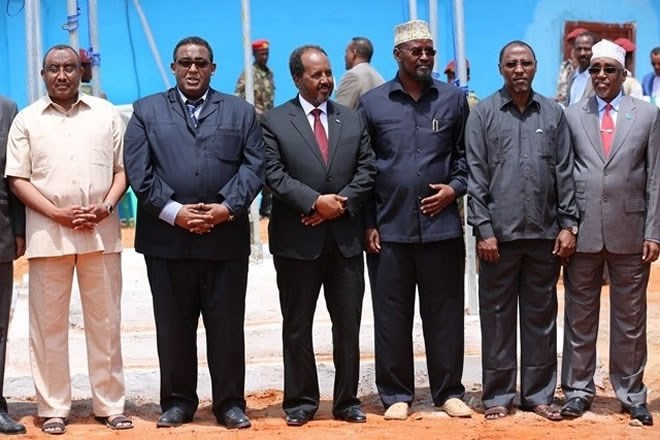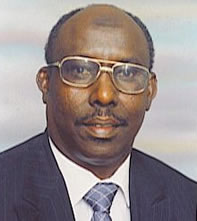
Federal and Regional Leaders

by Mohamud M Uluso
Tuesday, July 05, 2016
The 5 Presidents, the Speaker of a defunct federal parliament, the Prime Minister and Deputy Prime Minister of a moribund Council of Ministers, who form Somalia’s National Leadership Forum (NLF), are not offended by the defenestration of the Somali Constitution and not embarrassed by the conflict of interests for being candidates and at the same time authors of the 2016 electoral rules. The leaders of the Forum forgot that a free, fair, and transparent political election is the cornerstone of the Somali State building.
The international community formed the NLF to bypass the self-destructed and delegitimized federal institutions of parliament and Council of Ministers for corruption and inefficiency and to create an image of unified governing of Somalia as an alternative. Unfortunately, the apparent shared interest of the members of the NLF is to establish and consolidate multiple unaccountable one-man rule systems of governance in Somalia, far from the popular aspiration for effective national democratic system of governance.
Under the constant pressure of the international community, the NLF held several meetings to set biased rules for the 2016 election. The series of decisions issued so far are repetitive, disorganized, ill-timed, unfinished, and in contradiction with the provisions of the provisional constitution. There are no judicial or other institutions responsible for the enforcement of the electoral rules. The public expresses serious doubt and disappointment about the substance, clarity, and observance of those decisions.
In the context of regional states representing mostly one city ruled by one president, of one state yet to emerge, of one breakaway state, and of Benadir region under the authority of the federal President, the NLF distributed the 275 members of the Lower House (MP-LH) and the 54 members of the Upper House (MP-UH) of the federal parliament to six Regional Administrations and Benadir region: (1) Puntland got 40 MP-LH and 11 MP-UH; (2) Jubbaland got 39 MP-LH and 8 MP-UH; (3) Southwest got 69 MP-LH and 8 MP-UH; (4) Galmudug got 36 MP-LH and 8 MP-UH; (5) Hiraan and Middle Shabelle regions (emerging state) got 37 MP-LH and 8 MP-UH; (6) Somaliland got 47 MP-LH and 11 MP-UH; (7) Benadir region got 7 MP-LH. The Forum made the disclaimer that the distribution of seats to the various regional states will not have any bearing on the 2020 constituency based one person and one vote election.
Subsequently, the NLF increased the 54 seats of the Upper House by adding 2 seats allocated to the Benadiri Community in Mogadishu. It also transferred 3 seats of Lower House from Puntland to Jubbaland regional state. The NLF did not provide explanation for the change but it highlights the underlying territorial claims of clans in relation to clan based federal system.
For the difference of conditions between the various regional states-cum-administrations and regions, the incumbent leaders have wide latitude to manipulate the outcomes of the electoral process. Particularly, the electoral process for the MPs of the Upper House is flawed and unfair.
Shortly before the NLF meeting held in Baidoa on June 22-25 2016, the president of the federal government issued an order (not decree for lack of legal basis) concerning the appointment of members of the FEIT which included Ministers and officials working for NLF leaders. One observer asked about his opinion on the list joked that he was surprised by the fact that the names of the three top leaders of the federal government were not in the list. This suggests how the people gave up the hope of having free and fair election in 2016 under the current regime.
When the international community rejected the FEIT list for the improper inclusion of Ministers and loyalists, the NLF replaced the ministers with officials from their offices, which again undercuts the principal of independence and credibility of the electoral body. The majority of the electoral officials are vulnerable to the influences of their bosses who control their benefits and future expectations or they are known partisans in their communities.
In addition, the NLF approved an amended 2012 list of 135 traditional leaders (TL) who selected the members of federal parliament. In contrast to the 2012 TL, the 2016 TL will validate the list of 275 Electoral Colleges of 51 voters each. The list of electoral voters will be submitted to the FEIT and SEIT for casting the delegated votes in accordance with secret ballots. Voters will vote to the candidates to the lower house of the federal parliament.
The NFL did not explain the criteria for the amendment of 2012 list. But, circulated information affirmed that the NLF leaders agreed to replace only the traditional leaders who passed away and to leave the rest unchanged. However, the published list indicate that some traditional leaders who did not pass away but considered not loyal to NLF leaders were replaced with loyal ones, while new legitimate TL seen as disloyal were denied to be included.
This selective replacements have proved once again that the leaders of NLF are determined to perfect the 2016 electoral manipulation. The control of FEIT and SEIT and TL facilitates institutional manipulation which is more effective and less cost for electoral gain.
The NLF decisions and steps have progressively perfected the manipulation tactics of 2016 election. The international community as an advocate and arbiter of free, fair, and transparent election process seems unable to match the electoral rules with the guiding principles agreed upon for electoral integrity.
According to studies on electoral manipulations and frauds, incumbent political leaders engage in three different tactics of electoral manipulations for political gains. The three tactics are institutional manipulations, coercion, and co-optation.
The institutional manipulation comes under the form of exclusion of contenders, secret or fraudulent selection of the electoral colleges and misuse of electoral management bodies and judicial system. The coercion comes under the forms of use of security forces for arrests, intimidation, harassment, and restriction of public gathering of opposition supporters, prohibition of campaign posters, and repression of free press. The co-optation comes under the form of vote buying and other types of corruption with the use of public resources and powers.
The studies found that in authoritarian and fragile regimes where the rule of law is weaker, the government bureaucracy is more vulnerable to the incumbents’ will and influences. Furthermore, weaker incumbents usually use repression and intimidation, while stronger incumbents facing competition prefer to use bribery or ballot fraud. In general, the behavior of the Somali incumbent leaders exemplifies the findings of the studies on electoral manipulation.
The Somali incumbent leaders are less inclined to improve the integrity of 2016 election. Therefore, it is more likely that the integrity of 2016 election will be worse than the one of 2012 when the signature of one traditional leader was sufficient for becoming a member of the federal parliament. Independent and impartial behavior of FEIT and SEIT, credible selection process of the Electoral Colleges, and control of corruption and sanctions are crucial for peaceful and acceptable election results.
Mohamud M Uluso
[email protected]